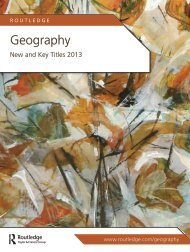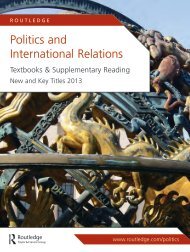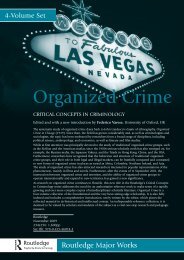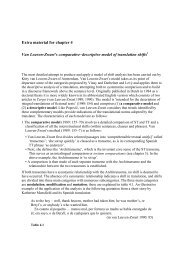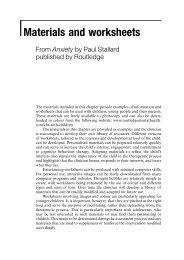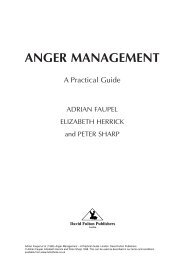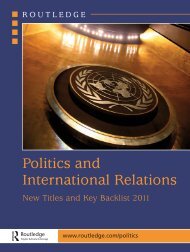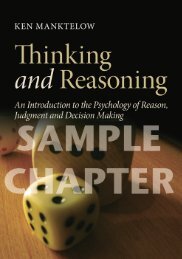Easily na - Routledge
Easily na - Routledge
Easily na - Routledge
Create successful ePaper yourself
Turn your PDF publications into a flip-book with our unique Google optimized e-Paper software.
Forthcoming in 2011<br />
3rd Edition<br />
Terrorism Versus Democracy<br />
The Liberal State Response<br />
Paul Wilkinson, University of St. Andrews, UK<br />
Series: Cass Series on Political Violence<br />
’From one of the founding fathers of terrorism<br />
studies, an urgent and necessary reminder of that<br />
which we must hold dear in combating all forms<br />
of terrorism. Paul Wilkinson understands the vital<br />
lessons to be learned from responding to terrorism,<br />
and this updated edition of his landmark book is<br />
absolutely essential reading.’ – John Horgan,<br />
University of St. Andrews, UK<br />
‘This is a well-argued, balanced book on a subject<br />
where sound judgement is often lacking. Professor<br />
Wilkinson, one of the leading authorities on the<br />
subject of terrorism, discusses both the terrorist<br />
threat and the appropriateness of military, legal<br />
and diplomatic responses with clarity and persuasion.<br />
This book is an important addition to the literature<br />
on terrorism and deserves to be widely read.’<br />
– Alex Schmid<br />
This acclaimed study examines both the new terror<br />
networks and those that have been around for decades.<br />
This new edition brings it up-to-date with the dramatic<br />
opening of the twenty-first century, with new chapters<br />
on the 9/11 attacks, the growth of inter<strong>na</strong>tio<strong>na</strong>l terrorism,<br />
the Al Qaeda network and the War on Terror.<br />
This text provides us with some much needed criteria for<br />
distinguishing between terrorists and freedom fighters<br />
and an expla<strong>na</strong>tion of the uses of terrorism as a political,<br />
social, religious and crimi<strong>na</strong>l weapon. Wilkinson also<br />
links the use of terrorism to a wider repertoire of<br />
struggle. He proposes a variety of possible countermeasures<br />
and valuable principles carefully distilled from<br />
the recent past to help design a response that is<br />
compatible with democratic principles, the rule of law<br />
and respect for human rights.<br />
This book is essential reading for undergraduate and<br />
postgraduate students of terrorism studies, political<br />
science and inter<strong>na</strong>tio<strong>na</strong>l relations, as well as for policy<br />
makers and jour<strong>na</strong>lists.<br />
Selected Contents: Preface. Glossary of Terrorist Groups.<br />
Introduction to Revised Edition 1. Terrorism, Insurgency and<br />
Asymmetrical Conflict 2. The Emergence of Modern<br />
Terrorism 3. Origins and Key Characteristics of Al Qaeda<br />
4. Terrorist Backed Insurgencies 5. Politics, Diplomacy and<br />
Peace Processes: Pathways out of Terrorism? 6. Law-<br />
Enforcement, Crimi<strong>na</strong>l Justice and the Liberal State 7. The<br />
Role of the Military in Combating Terrorism 8. Hostage-<br />
Taking, Sieges and Problems of Response 9. Aviation Security<br />
10. The Media and Terrorism 11. Inter<strong>na</strong>tio<strong>na</strong>l Cooperation<br />
Against Terrorism 12. The Future of Terrorism 13. Conclusion.<br />
Further Reading and Bibliography<br />
January 2011: 234 x 156: 272pp<br />
Hb: 978-0-415-58800-3: £85.00<br />
Pb: 978-0-415-58799-0: £23.99<br />
For more information, visit:<br />
www.routledge.com/9780415587990<br />
Forthcoming in 2011<br />
Terrorism Studies<br />
A Reader<br />
Edited by John Horgan and Kurt Braddock, both<br />
at Pennsylvania State University, USA<br />
This book is a comprehensive<br />
Terrorism Studies Reader that<br />
aims to introduce and guide<br />
students through the most<br />
important articles on the subject<br />
of terrorism and political<br />
violence.<br />
Selected Contents: Studying<br />
Terrorism: An Introduction<br />
Section 1: Terrorism in Historical<br />
Context Section 2: Definitions<br />
Section 3: Understanding<br />
and Explaining Terrorism<br />
Section 4: Terrorist Movements Section 5: Terrorist Behaviour<br />
Section 6: Counterterrorism Section 7: Current Trends in<br />
Terrorism Section 8: The Future of Terrorism. Conclusions<br />
March 2011: 246 x 174: 480pp<br />
Hb: 978-0-415-45504-6: £90.00<br />
Pb: 978-0-415-45505-3: £26.99<br />
For more information, visit:<br />
www.routledge.com/9780415455053<br />
Forthcoming in 2011<br />
Terrorism: The Basics<br />
James Lutz and Brenda J. Lutz, both at India<strong>na</strong><br />
University-Purdue, USA<br />
Series: The Basics<br />
Terrorism: The Basics is an<br />
ideal starting point for anyone<br />
interested in one of the most<br />
discussed, written about and<br />
a<strong>na</strong>lysed aspects of modern life.<br />
Common misconceptions about<br />
the <strong>na</strong>ture of terrorism and<br />
terrorists themselves are dispelled<br />
as the authors provide clear and<br />
jargon-free answers to the big<br />
questions:<br />
• What does terrorism involve?<br />
• Who can be classified as a terrorist?<br />
• What are terrorists trying to achieve?<br />
• Who are the supporters of terrorism?<br />
• Can there ever be an end to terrorist activity?<br />
These questions and more are answered with reference<br />
to contemporary groups and situations allowing readers<br />
to relate theory to what they have seen on the news.<br />
Written with clarity and insight, this book is the perfect<br />
first book on terrorism for students of all levels.<br />
Selected Contents: 1. What is Terrorism? 2. What do the<br />
Terrorists Want? 3. Who are the Terrorists? 4. What are the<br />
Techniques? 5. Who are the Targets of Terrorists? 6. Who<br />
Supports the Terrorists? 7. Some Major Terrorist Groups<br />
8. What can be Done to Counter Terrorism? 9. Will Terrorism<br />
Continue? 10. Conclusions<br />
March 2011: 198 x 129: 224pp<br />
Hb: 978-0-415-57333-7: £55.00<br />
Pb: 978-0-415-57334-4: £11.99<br />
For more information, visit:<br />
www.routledge.com/9780415573344<br />
Browse and order online: www.routledge.com/securitystudies<br />
Forthcoming in 2011<br />
Key TiTles 3<br />
Textbook<br />
Conflict, Security and<br />
Development<br />
An Introduction<br />
Paul Jackson and Danielle Beswick, both at<br />
University of Birmingham, UK<br />
This new textbook addresses<br />
the the impact of conflict and<br />
security on development<br />
initiatives. Currently, there is<br />
no available textbook that<br />
marries academic teaching and<br />
approaches with practical policy<br />
experience in the way this one<br />
does. The authors integrate<br />
these elements through three<br />
key features:<br />
• uses the best of recent<br />
academic theory, field research and policy to provide<br />
an overview of the connections between security and<br />
development<br />
• explores the implications of these connections for the<br />
theory and practice of development<br />
• investigates the challenges that arise for post-conflict<br />
reconstruction when we recognise that security and<br />
development are mutually contingent.<br />
The authors are experienced in both the theory and<br />
practice of development and conflict, and illustrate the<br />
theory about the links between conflict, security and<br />
development with practical examples, drawing on<br />
up-to-date literature and perso<strong>na</strong>l experience. Each<br />
chapter is informed by student pedagogy and the book<br />
will be essential reading for all students of development<br />
studies, war and conflict studies, and human security,<br />
and is recommended for students of inter<strong>na</strong>tio<strong>na</strong>l<br />
security and IR in general.<br />
Selected Contents: 1. Introduction 2. Security and<br />
Development - Mutually Reinforcing? 3. Accounting for<br />
Conflict in the Developing World 4. The Changing Nature<br />
of Conflict and its Impact on Development 5. Development<br />
Actors in War 6. Inter<strong>na</strong>tio<strong>na</strong>l and Humanitarian Intervention<br />
7. The Privatisation of Security 8. Development and Security<br />
in Post-Conflict Environments 9 . Inter<strong>na</strong>tio<strong>na</strong>l Responses<br />
to the Development-Security Dilemma 10. Conclusions:<br />
Development and Security - Reconnecting the Threads.<br />
Select Bibliography<br />
March 2011: 246 x 174: 224pp<br />
Hb: 978-0-415-49984-2: £85.00<br />
Pb: 978-0-415-49983-5: £22.99<br />
For more information, visit:<br />
www.routledge.com/9780415499835



